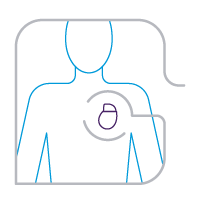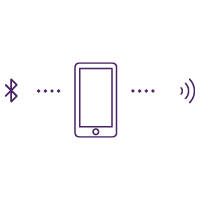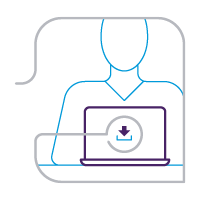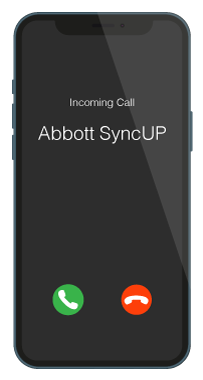Your Entrant™, Gallant™, or Neutrino™ NxT implantable cardiac defibrillator (ICD) or cardiac resynchronization therapy defibrillator (CRT-D) helps manage your heart rhythm irregularities and pairs with the myMerlinPulse™ app to help you stay continuously engaged in your treatment.
Download the App Today


It’s time to update your myMerlinPulse Mobile App*
For app version 1.0.107:
For app version 2.0.0:
* Some versions of the myMerlinPulse app may not yet be available in your region. We encourage you to check the Apple App Store‡ or Google Play Store‡ for the latest version compatible with your device.
We’re Here to Guide You
Receiving an ICD or CRT-D is an important step in your healthcare journey.
Your Abbott device delivers reliable treatment you can count on. With automatic daily checks, the myMerlinPulse app offers you peace of mind that information from your Abbott device is being sent to your clinic daily. Get the reassurance you need and the freedom you want with secure remote monitoring.



About the App
How It All Works
Implantable Device
Your Abbott device is implanted to help manage your heart rhythm irregularities.

Patient Smartphone
Your Abbott device pairs to the myMerlinPulse app using Bluetooth® wireless technology.

Clinician Portal
The mobile app securely shares your heart rhythm information from your Abbott device to your clinic.

How To Get Connected
iOS‡
Step 1: Unlock your phone and tap the myMerlinPulse™ app to open it.
Step 2: When prompted to allow “notifications”, tap Allow to continue.
Step 3: When prompted to “use Bluetooth”, tap OK to continue.
Step 4: When the End User License Agreement is displayed, tap Accept to continue.
Step 5: When the Privacy Notice is displayed, tap Acknowledge to continue.
Step 6: Tap Set Up Now.
Step 7: Tap the Date of Birth field.
Step 8: Swipe your finger up or down on the day, month, and year until your date of birth is highlighted in the middle, and then tap Done.
Step 9: Tap the Device Serial Number field.
Step 10: Type the serial number of your heart monitor. The serial number can be found on your patient identification (ID) card.
Step 11: Tap on the arrow. If you are asked for an activation code during the pairing process, you’ll choose how you would like to receive the activation code. Your activation code is valid for six hours.
Step 12: Tap Pair Now.
Step 13: A Bluetooth® Pairing Request message will pop up. Enter the pairing code displayed above this message, in the middle of your screen and tap Pair.
Step 14: The Setup Complete page will open. Read the Guidance for Use and Tap Done.
Android‡
Step 1: Unlock your phone and tap the myMerlinPulse™ app to open it.
Step 2: When prompted to allow “notifications”, tap Allow to continue.
Step 3: When the End User License Agreement is displayed, tap Accept to continue.
Step 4: When the Privacy Notice is displayed, tap Acknowledge to continue.
Step 5: When prompted to allow “nearby devices” or “location permissions”, select “Allow” to continue.
Step 6: When prompted to “always run in background”, tap allow to continue.
Step 7: Tap Set Up Now.
Step 8: Tap the Date of Birth field.
Step 9: Tap the year and scroll to select the year, tap the arrows to select the month, tap the day to select the day, and then tap OK.
Step 10: Tap the Device Serial Number field.
Step 11: Type the serial number of your heart monitor. The serial number can be found on your patient identification (ID) card.
Step 12: Tap on the arrow. If you are asked for an activation code during the pairing process, you’ll choose how you would like to receive the activation code. Your activation code is valid for six hours.
Step 13: Tap Pair Now.
Step 14: A Bluetooth® Pairing Request message will pop up. Wait for the popup to dismiss automatically.
Step 15: The Setup Complete page will open. Read the Guidance for Use and Tap Done.
SyncUP™ Support and First-Time App Setup**
If you need help setting up your app, please talk to your doctor about SyncUP Remote Monitoring Support. By making the connection between your device and your clinic, you can be confident that your doctor is receiving the information needed to monitor your heart rhythm without an office visit.
Within five days of your implant procedure, an expert from SyncUP support will call to help you connect your device.
If you do not hear from us within five business days, please use the contact information below to contact us for app setup assistance.

Europe
Belgium | +32 800 1 22 33 | |
France | +33 800 000 565 | |
Germany | +49 6196 77 11 444 | |
Ireland | +353 1800 719 893 | |
Italy | +39 02 3596 1070 | |
Spain | +34 900 94 32 39 | |
United Kingdom | +44 800 389 2714 |
Asia-Pacific
Australia | +61 1800 899 081 | |
Japan | +81 120 989 790 |
The SyncUP support expert will:
- Answer your questions about remote monitoring
- Determine if your smartphone can support using the mobile app to send information to your doctor and, if not, help identify other options such as an Abbott mobile transmitter
- Help you download the app and pair it to your device
- Explain how to use the app
- Assist you with sending device information to your doctor, if needed
** Your doctor's office must be enrolled with the SyncUP Remote Monitoring Support service. SyncUP Remote Monitoring Support is not available in all geographies.



Common Questions About myMerlinPulse App
What does the app do?
Based on how your healthcare provider has set up your app, the app can automatically collect relevant data from your implanted heart device and send it to your clinic. You can also send a transmission from the app at your clinic’s request.
How should I plan ahead for lack of internet access?
Inform your clinic of your travel arrangements. Your heart device constantly monitors your heart activity and records cardiac events. If the app detects anything your doctor wants to be aware of, it will send the information to your clinic when you are connected to the internet. Stay connected to the internet (Wi-Fi or cellular data) as often as possible.
When does the app perform daily device checks?
Device checks typically occur around 2 a.m. every day. Keep your mobile device near you (within 5 feet or 1.5 meters) when you sleep. If you are not close to your mobile device at that time, the app will retry automatically when you are nearby. Device checks occur automatically. If you open the app and happen to see a “Connect Now” button, you may tap the button to manually complete the check.
How close should I keep my mobile device to my implanted heart device?
Keep your mobile device within 5 feet or 1.5 meters of you. When you go to bed, keep your mobile device on your bedside table next to you.
How do I update my app to the latest version?
If auto-update is enabled, the update process will be completed automatically.
If auto-update is not enabled, you can update your app by visiting the Apple App Store‡ or Google Play‡ and searching for “myMerlinPulse.” Tap the update bar and open the myMerlinPulse Mobile App to complete the update process.
Patients can ensure their mobile app is always up to date by turning on Auto App Updates in their phone’s settings for the best experience.
For patients using an Abbott-provided mobile transmitter (where applicable), app updates occur automatically if the mobile device is powered on and has a strong cellular or Wi-Fi signal.
Minimum Smartphone Requirements
Your smartphone must meet the minimum requirements shown below for the myMerlinPulse app* to work. Determine which version of software, also known as your operating system your smartphone is using by visiting your Settings menu.
Bluetooth® wireless technology version 4.2 or greater

For app version 1.0.107:
iOS‡ version 12.0 or greater

Android‡ OS version 8.0 or greater

For app version 2.0.0:
iOS‡ version 15.0 or greater

Android‡ OS version 9.0 or greater

If you need help downloading or using the myMerlinPulse app, please contact Remote Care Technical Support using the contact information found at the bottom of this webpage.
* Some versions of the myMerlinPulse app may not yet be available in your region. We encourage you to check the Apple App Store‡ or Google Play Store‡ for the latest version compatible with your device.
See if your device is compatible with the myMerlinPulse Mobile App
Technical Support
Please use the contact information below to contact us if you need assistance with your app.
North America
United States & Canada | 1-877-756-4873 |
Europe & International Support
Note: for countries not listed below, please contact your clinic for guidance.
Austria | +43 1891 222 81 | |
Belgium | +32 800 1 22 33 | |
France | +33 800 000 565 | |
Finland | +358 50 539 9338 | |
Germany | +49 6196 77 11 444 | |
Ireland | +353 1800 719 893 | |
Italy | +39 02 3596 1070 | |
Luxembourg | +32 800 1 22 33 | |
Netherlands | +31 800 020 1729 | |
Spain | +34 900 94 32 39 | |
Sweden | +46 70 588 46 88 | |
United Kingdom | +44 800 389 2714 |
Asia-Pacific
Australia | +61 1800 899 081 | |
China | +86 2123067509 | |
Hong Kong | +85 229967615 | |
India | +91 4044600102 | |
Malaysia | +60 48887997 | |
New Zealand | +64 800 785 833 | |
Singapore | +65 69148090 | |
Taiwan | +88 6287522241 | |
Thailand | +66 27966500 | |
Japan | +81 120 989 790 |
Please have the following information available when you call:
- The implanted device serial number from your patient ID card
- Smartphone make and model
- Name of clinic that monitors the heart rhythm information from your Abbott device



Indications, Safety & Warnings
Rx Only
Brief Summary: Prior to using these devices, please review the Instructions for Use for a complete listing of indications, contraindications, warnings, precautions, potential adverse events and directions for use.
Intended Use: The Implantable Cardioverter Defibrillator (ICD) and Cardiac Resynchronization Therapy Defibrillator (CRT-D) devices are primarily intended for use with compatible leads detect and treat life threatening ventricular arrhythmias by providing ventricular antitachycardia pacing and ventricular cardioversion/defibrillation. In addition, these devices can detect and treat: chronic symptomatic bradyarrhythmia by providing sensing and pacing in the right ventricle; various atrioventricular conduction abnormalities by providing sensing and pacing in the right ventricle and/or right atrium. CRT-D devices sense cardiac activity and provide pacing to resynchronize the right and left ventricles.
The myMerlinPulse™ mobile application is intended for use by people who have an Abbott Medical implanted heart device and access to a mobile device. The app provides remote monitoring capability of the implanted heart device by transmitting information from the patient’s implanted heart device to the patient’s healthcare provider.
Indications: The ICD devices are indicated in patients who have already survived a cardiac arrest or are at a high risk of Sudden Cardiac Death (SCD) due to VT (ventricular tachycardia) or VF (ventricular fibrillation). Cardiac Resynchronization Therapy (CRT) devices are indicated for reduction of symptoms in patients who have congestive heart failure, a reduced left ventricular ejection fraction (LVEF) and a prolonged QRS duration. CRT-D devices are indicated in patients who meet the CRT indications and have already survived a cardiac arrest or are at a high risk of Sudden Cardiac Death (SCD) due to VT (ventricular tachycardia) or VF (ventricular fibrillation). The device is most commonly implanted within a device pocket in the pectoral region.
The myMerlinPulse™ mobile application is indicated for use by patients with supported Abbott Medical implanted heart devices.
Contraindications: Contraindications for use of the pulse generator system include ventricular tachyarrhythmias resulting from transient or correctable factors such as drug toxicity, electrolyte imbalance, or acute myocardial infarction.
The myMerlinPulse™ mobile application is contraindicated for use with any implanted medical device other than supported Abbott Medical implanted heart devices.
Adverse Events: Possible adverse events associated with the implantation of the pulse generator system include the following: Arrhythmia (for example, accelerated or induced), Bradycardia, Cardiac or venous perforation, Cardiac tamponade, Cardiogenic shock, Death, Discomfort, Embolism, Endocarditis, Erosion, Exacerbation of heart failure, Excessive fibrotic tissue growth, Extracardiac stimulation (phrenic nerve, diaphragm, pectoral muscle), Extrusion, Fluid accumulation within the device pocket, Formation of hematomas, cysts, or seromas, Heart block, Hemorrhage, Hemothorax, Hypersensitivity, including local tissue reaction or allergic reaction, Infection, Keloid formation, Myocardial damage, Nerve damage, Occlusion/Thrombus, Pericardial effusion, Pericarditis, Pneumothorax, Pulmonary edema, Syncope, Thrombosis, Valve damage. Complications reported with direct subclavian venipuncture include pneumothorax, hemothorax, laceration of the subclavian artery, arteriovenous fistula, neural damage, thoracic duct injury, cannulation of other vessels, massive hemorrhage and rarely, death. Among the psychological effects of device implantation are imagined pulsing, depression, dependency, fear of premature battery depletion, device malfunction, inappropriate pulsing, shocking while conscious, or losing pulse capability. Possible adverse device effects include complications due to the following: Abnormal battery depletion, Conductor fracture, Device-programmer communication failure, Elevated or rise in defibrillation/cardioversion threshold, Inability to defibrillate or pace, Inability to interrogate or program due to programmer or device malfunction, Incomplete lead connection with pulse generator, Inhibited therapy including defibrillation and pacing, Inappropriate therapy (for example, shocks and antitachycardia pacing [ATP] where applicable, pacing), Interruption of function due to electrical or magnetic interference, Intolerance to high rate pacing (for example dyspnea or discomfort), Lead abrasion, Lead fracture, Lead insulation damage, Lead migration or lead dislodgement, Loss of device functionality due to component failure, Pulse generator migration, Rise in DFT threshold, Rise in pacing threshold and exit block, Shunting of energy from defibrillation paddles, System failure due to ionizing radiation. Additionally, potential adverse events associated with the implantation of a coronary venous lead system include the following: Allergic reaction to contrast media, Breakage or failure of implant instruments, Prolonged exposure to fluoroscopic radiation, Renal failure from contrast media used to visualize coronary veins.
No potential adverse events have been identified with use of the myMerlinPulse™ mobile application.
™ Indicates a trademark of the Abbott group of companies.
‡ Indicates a third-party trademark, which is property of its respective owner.
Bluetooth and the Bluetooth logo are registered trademarks of Bluetooth SIG, Inc.
MAT-2406732 v2.0 | Item approved for Global use.
